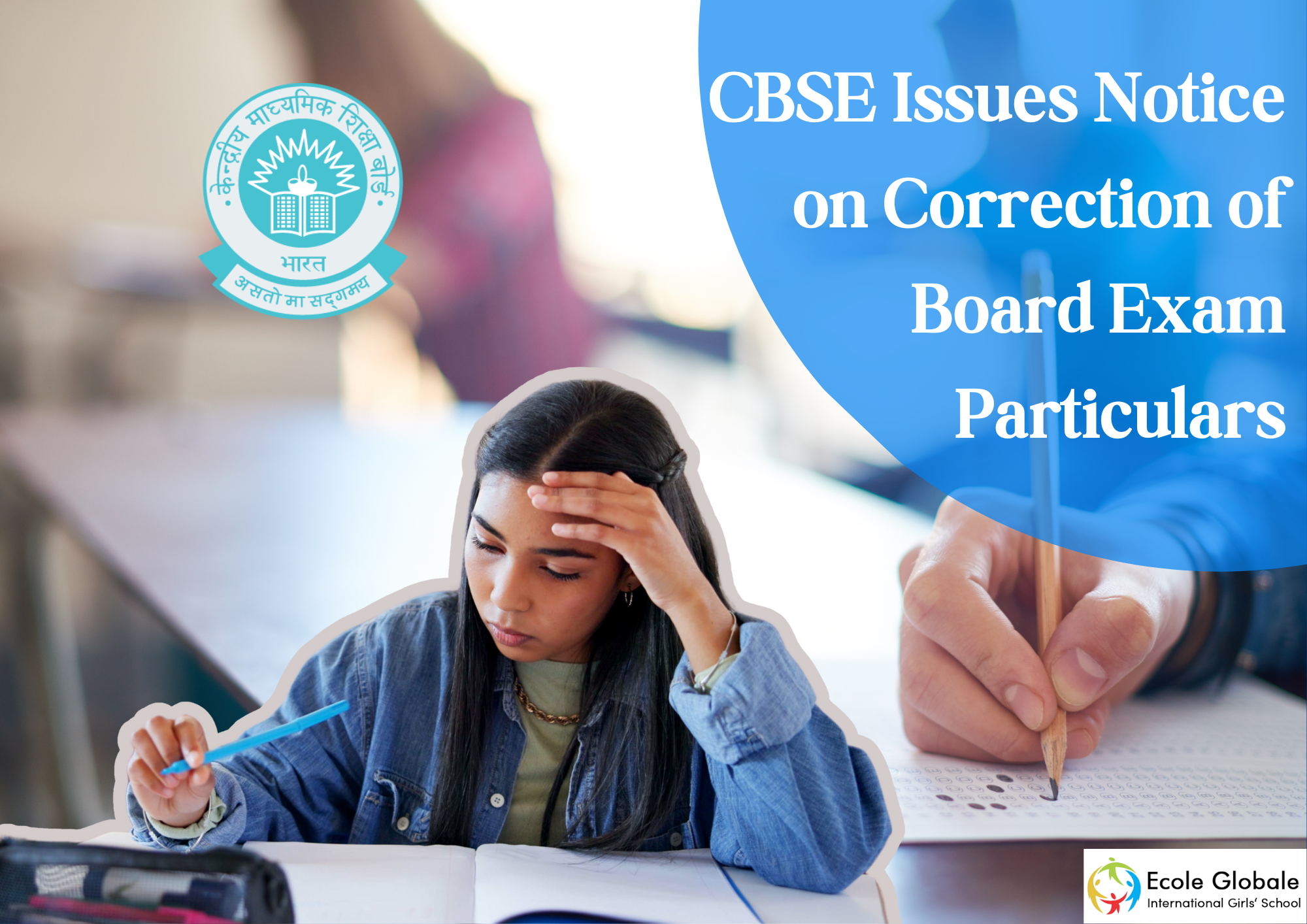In a recent official notice, the Central Board of Secondary Education (CBSE) announced provisions for the correction of board exam particulars.
This important communication is aimed at ensuring that candidates’ details, which may include personal information, photographs, and other data, are accurate and up-to-date before the board examinations begin.
For students, parents, understanding the CBSE Issues Notice on Correction process is essential to avoid any discrepancies that could impact exam results and future academic pursuits.
In this article, Ecole Global provide a comprehensive guide to the CBSE notice and explain the process for the correction of board exam particulars while highlighting its significance.
Key Details of the CBSE Issues Notice on Correction

Purpose and Scope
The primary purpose of the CBSE Issues Notice on Correction is to ensure that all candidate particulars are accurate.
This includes personal information, such as names, dates of birth, and photographs. Even small errors can have significant consequences during the evaluation and post-exam processing stages.
Thus, the notice allows corrections so that candidates can present their authentic identity.
Permitted Corrections

One of the standout features of the notice is its allowance for certain types of corrections. Notably, the notice permits:
- Interchange of Mother’s and Father’s Names: In cases where there has been an error in the order of parental names, candidates are allowed to make the necessary changes. This correction is crucial as it affects documentation and could potentially hinder the identification process at exam centers.
- Correction of Minor Spelling Errors: Errors in the spelling of names or other personal details can be rectified to ensure that official documents accurately reflect the candidate’s identity.
- Update of Photograph and Signature: If the uploaded photograph or scanned signature does not meet the requirements, candidates can replace them with updated versions.
By explicitly mentioning these corrections, the CBSE Issues Notice on Correction reinforces the board’s commitment to maintaining accurate and reliable candidate records.
Timelines and Submission Guidelines

According to the notice, there is a specified window during which candidates are required to submit their correction requests.
It is crucial to adhere to these deadlines to avoid any issues with the exam process.
The correction process is primarily conducted online through the CBSE portal, but in certain cases, schools also facilitate the submission of correction requests.
Key points in the submission guidelines include:
- Deadline: Candidates must submit correction requests within the stipulated time period as notified by CBSE.
- Documentation: Along with the correction request, candidates are required to provide supporting documents that validate the changes (for example, an affidavit or certified document in the case of a parental name interchange).
- Application Process: The process involves logging into the official CBSE website, verifying the pre-submitted details, and filling out the correction form accurately.
- Confirmation Receipt: Once the corrections are submitted, a confirmation receipt is generated. Candidates are advised to retain this document as proof of the correction request.
These systematic steps help ensure that the process is transparent and that every correction request is handled efficiently.
Why Correction of Board Exam Particulars is Crucial

Accurate exam particulars are crucial for several reasons:
- Avoiding Administrative Hurdles: Incorrect particulars may lead to discrepancies during identity verification at exam centers, resulting in delays or even disqualification.
- Ensuring Fair Evaluation: Accurate data helps maintain a fair assessment process. When candidate information is correct, there is a reduced risk of mismatches in results and records.
- Facilitating Smooth Admissions: Boards and colleges rely on these records for admissions processing. Any errors can create obstacles in getting into the desired higher education institution.
- Upholding Exam Integrity: By allowing corrections, CBSE ensures that candidates are not unduly penalized for administrative errors, thereby upholding the credibility of the board examinations.
Tips to Avoid Mistakes in Future Applications

While the current initiative helps address existing errors, it is equally important to minimize mistakes from the outset:
- Double-Check Information: Before final submission, review every detail on the application form.
- Maintain Clear Documentation: Ensure that all required documents are up to date and match the submitted information exactly.
- Seek Guidance: Don’t hesitate to ask for clarification from school officials or CBSE helplines if something is unclear during the application process.
- Stay Informed: Regularly check official CBSE notifications for any updates or changes in the correction process to stay ahead of deadlines.
FREQUENTLY ASKED QUESTIONS
Q1: What is the CBSE Issues Notice on Correction?
Ans: It is an official communication by CBSE allowing candidates to correct errors in their board exam particulars, ensuring accurate records.
Q2: What kinds of corrections are permitted under this notice?
Ans: Permitted corrections include minor spelling mistakes, updating photographs and signatures, and even the interchange of mother’s and father’s names.
Q3: Why has CBSE issued the CBSE Issues Notice on Correction?
Ans: CBSE issued the notice to maintain exam integrity, avoid administrative errors, and ensure that all candidate details are correct before the board exams.
Q4: What is the process for correcting board exam particulars?
Ans: Candidates must log in to the official CBSE portal, fill out the correction form with the updated information, attach the necessary documents, and submit the request within the given deadline.
Q5: What documents are needed to support correction requests?
Ans: Required documents can include attested copies for name changes, updated photographs, and other certificates as per CBSE guidelines.









